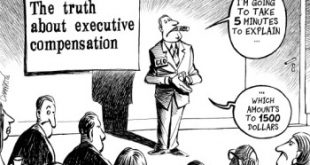The correlation between high executive pay and good performance is “negligible”, a new academic study has found, providing reformers with fresh evidence that a shake-up of Britain’s corporate remuneration systems is overdue. Although big company bosses enjoyed pay rises of more than 80 per cent in a decade, performance as measured by economic returns on invested capital was less than 1 per cent over the period, the paper by Lancaster University Management School says. “Our...
Read More »IPA’s weekly links
Guest post by Jeff Mosenkis of Innovations for Poverty Action. “Back in school we used to call it chew and pour,” he says. Meaning, for each possible question, the teacher gives you one correct answer to memorize — or “chew” — so that come test time, you can regurgitate it — “pour it” back to her verbatim. “And then,” adds Agbavor with a chuckle, “you forget about it. Nothing is retained.” That’s from one of my favorite podcasts, NPR’s Rough Translation, which is hosted by their former...
Read More »I Told You My TV Watching Habits Extend Past Law And Order…
[unable to retrieve full-text content]I Told You My TV Watching Habits Extend Past Law And Order…: I’m just waiting for a time where there’s an economics category when I’m visiting my parents because IT IS ON…
Read More »I Told You My TV Watching Habits Extend Past Law And Order…
[unable to retrieve full-text content]I Told You My TV Watching Habits Extend Past Law And Order…: I’m just waiting for a time where there’s an economics category when I’m visiting my parents because IT IS ON…
Read More »How Not to Sound Like an Idiot About the Trade Deficit, Part 1
[unable to retrieve full-text content]How Not to Sound Like an Idiot About the Trade Deficit, Part 1: Hey look, a 5-minute solution to sounding like a complete moron, you should check it out. (not callig you a moron, I’m sure you’re lovely, I…just read it ok)
Read More »How Not to Sound Like an Idiot About the Trade Deficit, Part 1
[unable to retrieve full-text content]How Not to Sound Like an Idiot About the Trade Deficit, Part 1: Hey look, a 5-minute solution to sounding like a complete moron, you should check it out. (not callig you a moron, I’m sure you’re lovely, I…just read it ok)
Read More »Economic Consulting, Or “Why If You Think You Can Make $750 An Hour Cleaning Data You Will Be Very Disappointed”…
[unable to retrieve full-text content]Economic Consulting, Or “Why If You Think You Can Make $750 An Hour Cleaning Data You Will Be Very Disappointed”…: People generally seem curious about what sorts of jobs people with training in economics do, so I decided to turn a Twitter thread into a thing.
Read More »Economic Consulting, Or “Why If You Think You Can Make $750 An Hour Cleaning Data You Will Be Very Disappointed”…
[unable to retrieve full-text content]Economic Consulting, Or “Why If You Think You Can Make $750 An Hour Cleaning Data You Will Be Very Disappointed”…: People generally seem curious about what sorts of jobs people with training in economics do, so I decided to turn a Twitter thread into a thing.
Read More »Why the euro cannot be saved
Why the euro cannot be saved The euro may be approaching another crisis. Italy, the eurozone’s third largest economy, has chosen what can at best be described as a Euroskeptic government. This should surprise no one. The backlash in Italy is another predictable (and predicted) episode in the long saga of a poorly designed currency arrangement, in which the dominant power, Germany, impedes the necessary reforms and insists on policies that exacerbate the...
Read More »Noah Smith’s unicorn defence of economics
Noah Smith’s unicorn defence of economics Unlike the old neoclassical theories, game theory concerns strategic interaction between different people. It can encompass things like wage bargaining, fraud and lots of other things that neoclassical equilibrium glosses over or leaves out. And in game theory, free markets full of rational actors can easily, even regularly, lead to inefficient outcomes that require government intervention. Noah Smith/Bloomberg...
Read More » Heterodox
Heterodox




